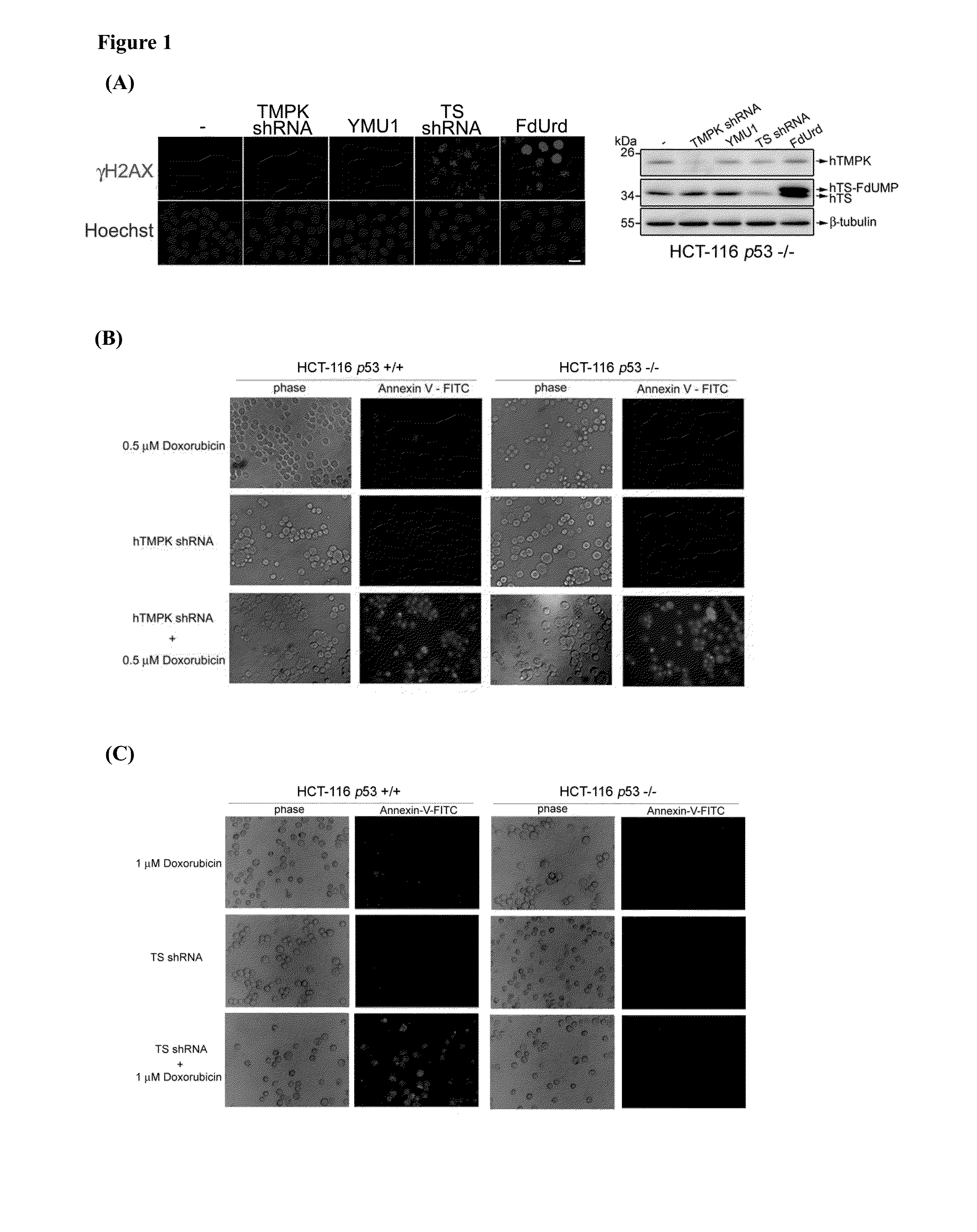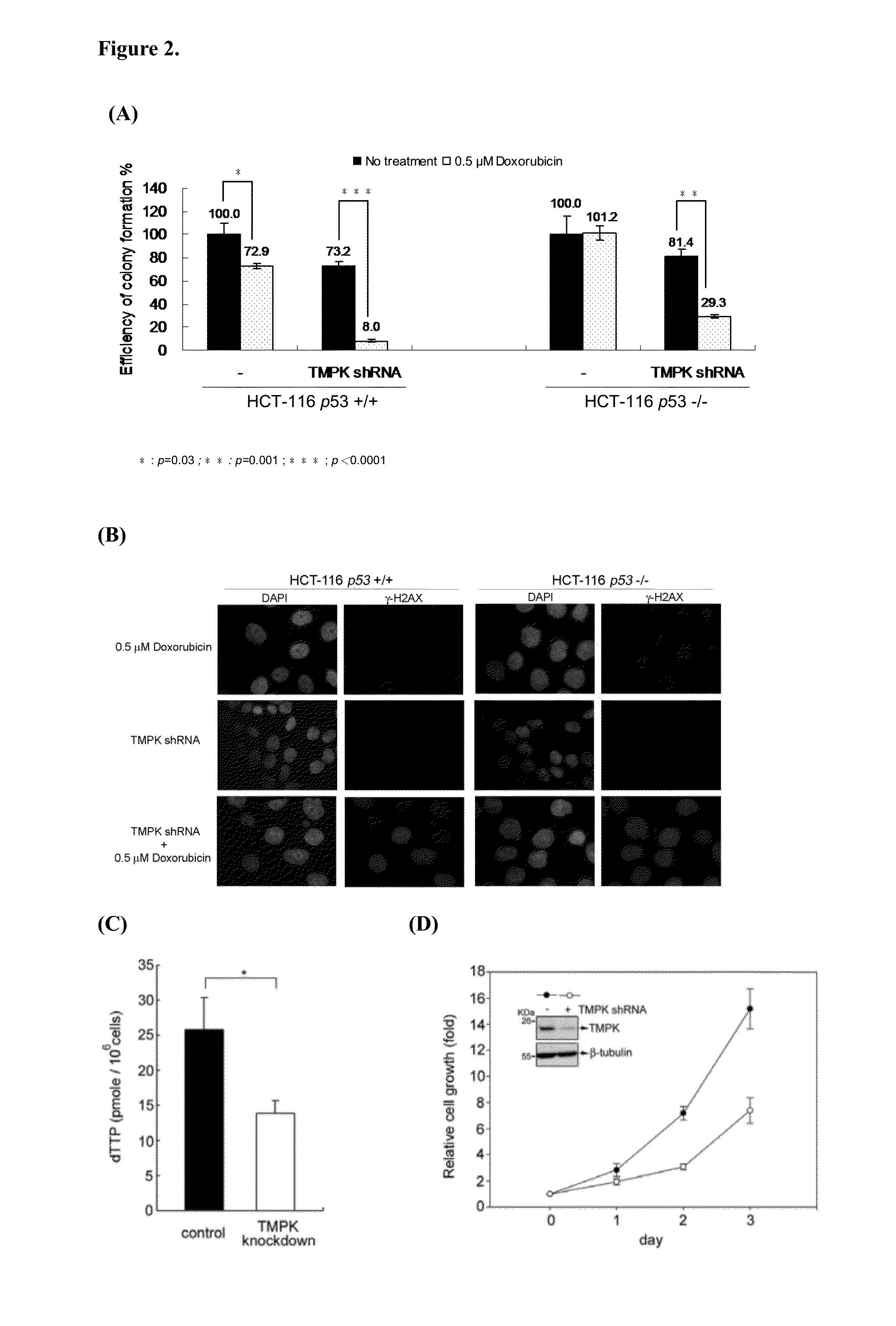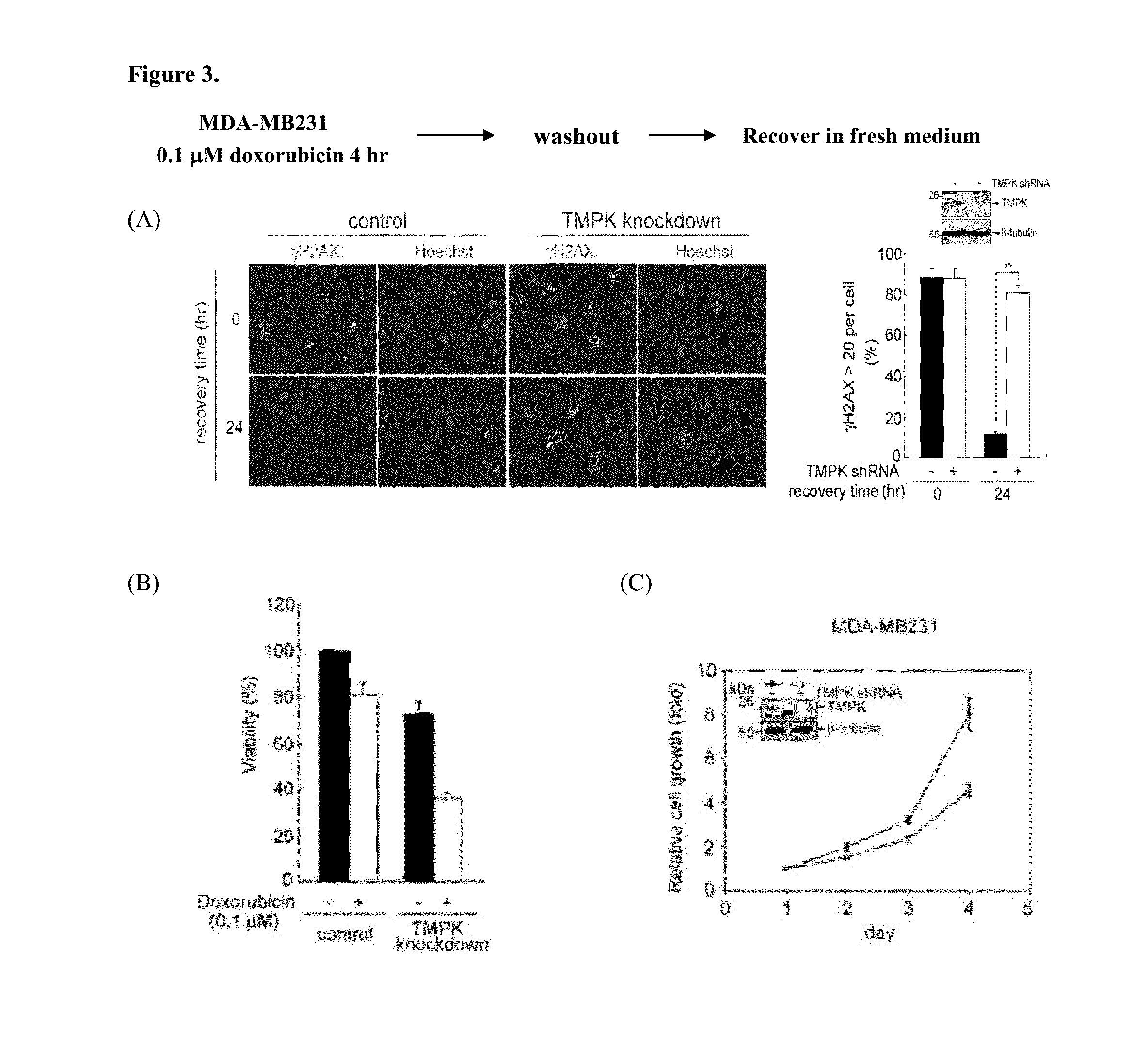Targeting human thymidylate kinase induces DNA repair toxicity in malignant tumor cells
a technology of thymidylate kinase and malignant tumor cells, which is applied in the direction of biocide, organic chemistry, group 3/13 element organic compounds, etc., can solve the problems of secondary cancer induced, cancer cell death, and lack of differentiation between tumor- and rapidly-dividing cells in normal tissues
- Summary
- Abstract
- Description
- Claims
- Application Information
AI Technical Summary
Benefits of technology
Problems solved by technology
Method used
Image
Examples
example 1
TMPK Knockdown has No Genotoxicity but Promoting Doxorubicin-Induced Cell Death in p53 Proficient and Deficient Colon Cancer Cells
[0186]To understand the differential DNA damage effect of blocking thymidylate kinase (TMPK) and thymidylate synthase (TS) in colon cancer cells. TMPK or TS expression was depleted in colon cancer cells, HCT-116 p53− / −, by infection with lentivirus expressing corresponding shRNA. By γH2AX immunofluorescence staining to indicate DNA lesions in nuclei, we found that TS but not TMPK depletion led to genotoxicity. In agreement, cells treated with TS inhibitor, 5-fluoro-2′deoxyuridine (FdUrd) but not an hTMPK inhibitor, YMU1, also gave DNA lesions in nuclei (FIG. 1A). Thus, unlike targeting TS, TMPK inhibition on its own has no genotoxicity. We further tested the effect of TMPK and TS depletion on chemosensitization. Low dose of Doxorubicin treatment was used a chemotherapeutic agent that generates DNA double-strand breaks. TMPK depletion caused apoptosis afte...
example 2
TMPK Knockdown Increases Doxorubicin Sensitivity and Suppresses DNA Repair, Cell Growth and dTTP Pool in Colon Cancer Cells
[0187]We then tested the effect of TMPK knockdown in combination with low dose of doxorubicin treatment on cell viability. Consistent with the apoptotic effect, the viability of HCT-116 p53− / − and p53+ / + cells was significantly reduced by the combination of TMPK depletion with low dose of doxorubicin (FIG. 2A). To understand the chemosensitization effect of TMPK depletion is due to suppressing the repair of Doxorubicin-induced DNA lesion. We performed γH2AX immunofluorescence staining to indicate the repair of doxorubicin-induced DNA lesions. After recovering cells from doxorubicin exposure for 24 hr, the results showed that DNA lesions as indicated by γH2AX in control cells disappeared, in contrast, DNA lesions were sustained in TMPK depleted cells (FIG. 2B). Herein, we conclude that blocking TMPK inhibits DNA repair, thus promoting genotoxic stress-induced cel...
example 3
TMPK Depletion Inhibits the Repair of Doxorubicin-Induced DNA Damage and the Cell Growth in Breast Cancer Cells
[0188]Doxorubicin is a major chemotherapeutic agene in breast cancer treatment. We further tested the effect of TMPK depletion on sensitizing breast cancer cells to doxorubicin. MDA-MB231 breast cancer cell line represents a triple-negative breast cancer model. The effect of TMPK depletion on DNA repair of low dose of doxorubicin-induced DNA double-strands breaks was examined. Similar to colon cancer cells, TMPK depletion also impaired DNA repair as revealed by sustained γH2AX staining in MDA-MB231 breast cancer cells recovered from doxorubicin exposure (FIG. 3A). In agreement, the combination of TMPK with low dose of doxorubicin significantly reduced cell viability (FIG. 3B). Since TMPK deletion decreased the dTTP synthesis, the growth rate of TMPK depleted cells was slower (FIG. 3C). In summary, TMPK suppression inhibits the repair of DNA double-strand breaks in breast ca...
PUM
| Property | Measurement | Unit |
|---|---|---|
| Inhibition | aaaaa | aaaaa |
| Inhibition | aaaaa | aaaaa |
| Inhibition | aaaaa | aaaaa |
Abstract
Description
Claims
Application Information
 Login to View More
Login to View More - R&D
- Intellectual Property
- Life Sciences
- Materials
- Tech Scout
- Unparalleled Data Quality
- Higher Quality Content
- 60% Fewer Hallucinations
Browse by: Latest US Patents, China's latest patents, Technical Efficacy Thesaurus, Application Domain, Technology Topic, Popular Technical Reports.
© 2025 PatSnap. All rights reserved.Legal|Privacy policy|Modern Slavery Act Transparency Statement|Sitemap|About US| Contact US: help@patsnap.com



